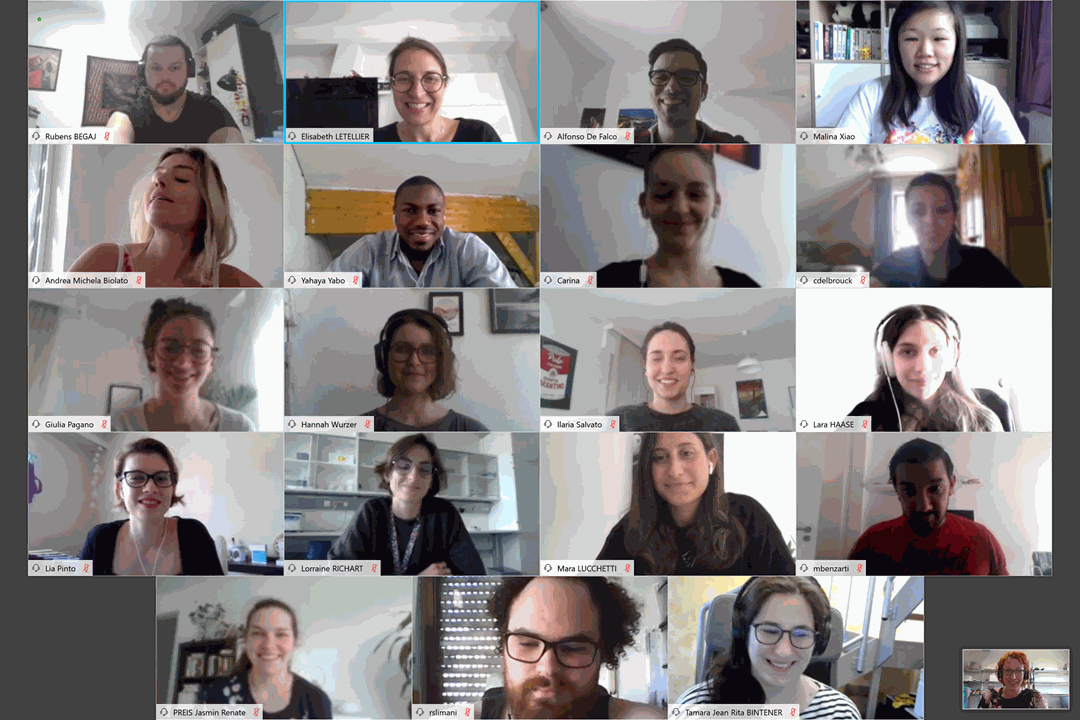11th May 2020
3 min read
CANBIO training programme goes digital!
First online module successfully completed
The third module of the 2019/2020 curriculum of the CANBIO doctoral research and training programme ended on Friday, May 8th. It was the first set of lectures to be delivered entirely remotely due to the current COVID-19 pandemic.
The ability of cancer cells to escape immunosurveillance and develop drug resistance mechanisms prompted the launch of the Cancer Biology “CANBIO” doctoral training unit (DTU) in 2016, focusing specifically on tumour escape mechanisms. The programme involves 18 PhD students at the Luxembourg Institute of Health (LIH), the University of Luxembourg (UL) and the Laboratoire National de Santé (LNS) and is supported by the Luxembourg National Research Fund (FNR). In addition to the project-based training, the CANBIO DTU has implemented a specific training curriculum which consisted of three main modules, running between October 2019 and May 2020.
The third module, which took place between April 20th and May 8th, was dedicated to the ‘Intrinsic escape mechanisms’ allowing cancer cells to evolve independently and circumvent the body’s immune defences. Specifically, through a series of ten lectures and workshops, the module covered the basic principles of tumorigenesis and therapy, preclinical models, tumour heterogeneity in relation to therapeutic principles, as well as invasion and metastasis. The course boasted leading scientists from the participating CANBIO institutes as the key trainers, including Prof Rolf Bjerkvig (LIH/University of Bergen), Prof Michel Mittelbronn (LNS/LIH/UL), Dr Anna Golebiewska (LIH), Dr Johannes Meiser (LIH), Prof. Iris Behrmann (UL), Dr Daniel Stieber (LNS), Dr Clément Thomas (LIH), Dr Elisabeth Letellier (UL), Dr Bassam Janji (LIH) and Dr Alessandro Michelucci (LIH/UL).
Aside from its cutting edge research topics, this module was particularly innovative also from a delivery standpoint. Indeed, it was the first to be carried out completely remotely through Webex meetings, due to the confinement measures in response to the current COVID-19 context.
“CANBIO concentrates on the mechanisms enabling cancer cells to constantly adapt to their environments and survive therapeutic treatments. Unfortunately, these molecular changes do not stop with the COVID-19 pandemic, and so we too decided to adapt to the current situation in order to keep delivering quality cancer training to our students, providing them with the knowledge and skills they need to eventually develop novel solutions to the pressing issue of tumour escape”, says Prof Simone Niclou, Director of the LIH Department of Oncology (DONC) and CANBIO coordinator. “Our PhD candidates have once again proved their commitment to their scientific training and their flexibility, which was key in ensuring the successful outcome of the virtual course”, she concludes.
The module complemented the previous two, namely “Computational approaches to disease monitoring and network analysis”, which ran in October 2019, and “Induced Escape Mechanisms”, which took place in February 2020.
The CANBIO programme, which has a duration of 6.5 years, is a joint initiative of the Luxembourg Institute of Health, the University of Luxembourg and the Laboratoire National de Santé, in collaboration with national and international partners, including the Centre Hospitalier de Luxembourg (CHL), the University of Bergen (Norway) and the University of Paris-Saclay (France). The programme is funded by the Luxembourg National Research Fund (FNR) through the competitive PRIDE programme and by intramural funds from the Luxembourg Ministry of Higher Education and Research (MESR).

